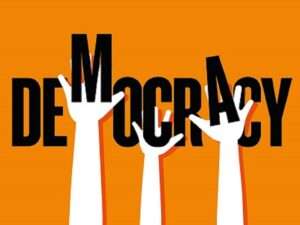The Volokh Conspiracy
Mostly law professors | Sometimes contrarian | Often libertarian | Always independent
Not Everything Bad is "Anti-Democratic" - and that which is Democratic isn't Always Good
Tyler Cowen explains why it's a mistake to conflate democracy with what is good and just.

In a recent Bloomberg column, my George Mason University colleague Tyler Cowen - a prominent economist - warns against the growing tendency to conflate "democracy" with good and just policy, and describe anything we oppose as "anti-democratic":
One of the most disturbing trends in current discourse is the misuse of the term "anti-democratic." It has become a kind of all-purpose insult, used as a cudgel to criticize political and intellectual opponents. Not only is this practice intellectually lazy, but it threatens to distort the meaning and obscure the value of democracy.
The advantages of democracy are obvious, at least to me, and deserve greater emphasis:
- Democracy helps produce higher rates of prosperity and economic growth.
- Democratic governments are more likely to protect human rights and basic civil liberties.
- As philosopher Karl Popper stressed, democracy helps societies escape the very worst rulers, by voting them out of office and in the meantime constraining them with checks and balances.
Of course democracy is not perfect. First, a lot of individual democratic decisions are not very good…. Second, there are periods when some countries might do better as non-democracies, even though democracy is better on average…
Too much commentary ignores these nuances….
The danger is that "stuff I agree with" will increasingly be labeled as "democratic," while anything someone opposes will be called "anti-democratic." Democracy thus comes to be seen as a way to enact a series of personal preferences rather than a (mostly) beneficial impersonal mechanism for making collective decisions….
[M]any on the political left in the US have made the charge that the Supreme Court's decision to overturn Roe v. Wade was "anti-democratic." It is fine to call Dobbs a bad decision, but in fact the ruling puts abortion law into the hands of state legislatures. If aliens were visiting from Mars, they simply would not see that move as anti-democratic….
By conflating "what's right" with "what's democratic," you may end up fooling yourself about the popularity of your own views. If you attribute the failure of your views to prevail to "non-democratic" or "anti-democratic" forces, you might conclude the world simply needs more majoritarianism, more referenda, more voting.
Those may or may not be correct conclusions. But they should be judged empirically, rather than following from people's idiosyncratic terminology about what they mean by "democracy" — and, by extension, "anti-democratic."
The conflation of what is "democratic" with what is right and just has a number of unfortunate consequences. First, it promotes intellectual confusion. Second, and more importantly, it essentially defines away the possibility that democracy - understood, more reasonably, as a majoritarian political process - should be constrained in order to protect other values, and counter various predictable pathologies of democratic government, such as widespread voter ignorance and oppression of minority groups.
All too often there are trade-offs between democracy and other values, such as liberty, equality, and justice. We shouldn't let terminological confusion blind us to that reality.
I have made similar points about the need to avoid conflating democracy with good and just policy in previous writings, such as here:
Admittedly, the term "democratic" is sometimes used as just a kind of synonym for "good" or "just," rather than in the more narrow sense of referring to governance by majoritarian political institutions. By that standard, such policies as school segregation, cruel punishments, and laws banning same-sex marriage are inherently "undemocratic," no matter how much political support they enjoy. Whatever the linguistic merits of this usage, it is not analytically helpful. If anything good is by definition also democratic and anything democratic is by definition also good, then democracy ceases to be a useful concept for constitutional theory, or any other type of intellectually serious analysis.
Recognizing that democracy isn't inherently good and that not all evil and harmful policies are anti-democratic doesn't by itself tell us how much democracy should be constrained and in what way. But it does help remove conceptual confusion that impedes clear thinking on the subject.


Show Comments (216)